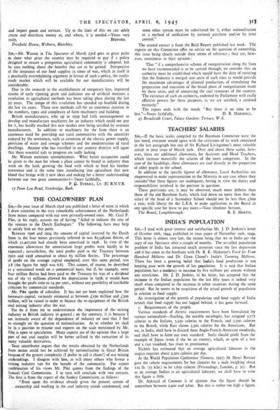THE COALOWNERS' PLAN
• your issue of March 23rd you published a letter of mine in which
I drew attention to the very remarkable achievements of the Netherlands State mines compared with our own privately-owned ones. Mr. Cecil F. Pike, in his reply, accuses me of having " failed to indicate the cost of the venture to the Dutch Exchequer." The following facts may help to satisfy him on this point.
Between 1906 and 1924 the amount of capital invested by the Dutch State in the four mines previously referred to was 82,548,000 florins, of Which 51,4o7,00o had already been amortised in 1938. In view of the enormous allowances for amortisation large profits were hardly to be expected ; nevertheless, the total profits paid to the Treasury between .1910 and 1938 amounted to about 65 million florins. The percentage of profit on the average capital employed, over this same period, was 3.8 (the figure for 190 was, 6.8). This cannot, of course, be described as a sensational result on a commercial basis, but if, for example, some four million florins had been paid-to the Treasury byway" of a dividend out of the 15 millions allowed for depreciation in 1938, it would_ have brought the profit ratio to ret per cent., without any possibility of justifiable criticism by commercial standards.
"Mr. Pike speaks of subsidies. It 'has not yet been explained how the necessaryicapital, variously estimated at between £roo million and £300 million, Will be raised in order to finance" the re-equipment of the British coal mining industry after the war.
Far be it from me to underestimate the importance of the 'mining industry to British industry in general ; on the contrary, it is because I am intensely aware of the dependence of industry on coal that I feel "so strongly on the question of nationalisation. As to whether we shall be in a position to resume coal exports on the scale mentioned by Mr. Pike is open to speculation. Many experts are of the opinion that a large part of our coal surplus will be better utilised in the extraction of its many valuable derivatives.
Your contributor argues that the results obtained by the Netherlands State mines could not be achieved by nationalisation in Great Britain becauseof the greater complexity (I prefer to call it chaos!) of our mining undertakings. I disagree with him, as will many others who favour a mining industry run for the benefit of the community. For expert confirmation of his views Mr. Pike quotes from the findings of the Samuel Coal Commission. I in turn will conclude with two extracts. The first is from the report of the Sankey Commission, as follows: "Even upon the evidence already given the present system of ownership and working in the coal industry stands condemned, and some other system must be substituted for it, either nationalisation or a method of unification by national purchase and/or by joint control."
The second extract is from the Reid Report published last week. The experts on this Committee offer no advice on the question of ownership, this issue being dearly outside their terms of reference ; they are, how- ever, unanimous in their opinion: That " if a comprehensive scheme of reorganisation along the lines we have recommended is to be carried through, we consider that an authority must be established which would have the duty of ensuring that the Industry is merged into units of such sizes as would provide the maximum advantages of planned production, of stimulating the preparation and execution of the broad plans of reorganisation made by these units, and of conserving the coal resources of the country. The existence of such an authority, endowed by Parliament with really effective powers for these purposes, is, we are satisfied, a cardinal necessity."
The report ends with the words " But there is no time to be


























 Previous page
Previous page